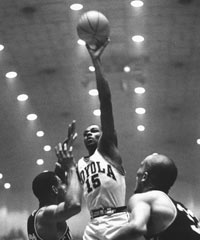NCAA News Archive - 2006
« back to 2006 | Back to NCAA News Archive Index
1963 Mississippi State basketball team broke barriers in game against Loyola
|
The NCAA News
The outcome of the 1963
With elements such as segregation, clandestine flights and court injunctions as the backdrop, it is easy to realize why Loyola’s 61-51 victory is merely a footnote to the contest being named as one of the Top 25 Defining Moments in the first 100 years of the NCAA.
The mere fact of
Though several significant racial incidents already had occurred, such as James Meredith needing to be protected by federal troops and
“When all the flashbulbs went off, I knew it was more than a game,” said Harkness, who grew up in
Persuasive change
In 1963,
Before the age of at-large selections to the NCAA tournament, winning a conference championship was the only ticket to the postseason in those days. But
During the 1955-56 season,
As the Bulldogs were closing in on the 1963 SEC title, the subject came up again, only this time there were signs of change. New Mississippi State President Dean Colvard and coach Babe McCarthy wanted their players to have the opportunity to compete. Colvard built up some political clout and word quickly spread among people on both sides of the issue.
“One of my English professors stopped me on campus and told me to tell my teammates that there wouldn’t be a problem if public funds were cut off (as had been threatened),” Gold said. “He said we had enough private contributions pledged that if Dr. Colvard and Coach McCarthy wanted to play in the tournament, we would be able to do so. That was the first time I had the feeling that this was more than just going to play a basketball game.”
More than half of the 5,200-member student body signed a petition stating that the team should play in the NCAA tournament. According to reports, about two-thirds of the letters Colvard received from Mississippians supported his decision. But opponents were vocal, too.
Under the radar
On the eve of the team’s departure to the NCAA regional site in
Colvard organized a secret meeting at a booster’s house, and officials decided that he and McCarthy would leave the state immediately by car.
The writ arrived on campus at
The players heard about the injunction via the radio, and team member Leland Mitchell suggested that the team pile in his car and leave as well. That plan was nixed, though, and assistant coach Jerry Simmons and athletic trainer Dutch Luchsinger stayed behind with the players.
The next morning, Luchsinger drove some reserve players to the airport to see if the police were there to stop the team flight. Seeing no one, Luchsinger called Simmons, who drove the starters to the plane.
“I heard some of the players say they were concerned about being arrested,” said Gold, the current superintendent of schools in Morgan County, Kentucky. “I thought it was directed more toward the people who were in charge. I did think there was a possibility that we wouldn’t get to go, because of the injunction being served. I never felt 100 percent sure until we got the plane off the ground.”
The plane stopped in
“Back then everyone was raised to do whatever a person in authority told you to do,” said W.D. “Red” Stroud, an all-SEC player during his senior year who today serves as a prison missionary. “When our coach told us we were going, that meant we were going. It was just like the other years. When they told us we couldn’t go, we turned in our uniforms. We didn’t argue, because you didn’t question authority back then.”
The Ramblers, who would go on to win the national title in 1963, waited patiently, but also with some apprehension.
“We knew there were some problems, but we knew we were going to play them,” said Harkness, who owns an athletics apparel store in
Ramblin’ to victory
Loyola had demolished
“Dean Smith gets all the credit for coming up with that offense, but Coach McCarthy was doing it back in the 1950s,” Stroud said.
The Bulldogs stayed within striking distance but couldn’t overcome Loyola.
“We didn’t realize until afterward all of what
“As the years have gone by, that game is more important to me than winning the national title,” Harkness said. “I mean that. This was something about life, and it influenced the way things were changing in the
© 2010 The National Collegiate Athletic Association
Terms and Conditions | Privacy Policy

